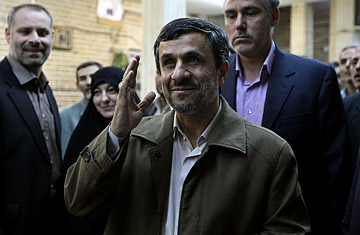
Iranian President Mahmoud Ahmadinejad gestures after voting at a polling station in Tehran on March 2, 2012. I
President Mahmoud Ahmadinejad is the Iranian leader Americans most love to hate, and he's not doing so well back home, either. Ahmadinejad was the big loser in Iran's parliamentary elections on Friday, the results of which show a solid victory for the hard-line supporters of Supreme Leader Ayatullah Ali Khamenei. Both camps had approached the election as a public showdown in the bitter feud between the president and the Supreme Leader that has raged for the past two years. Ahmadinejad, who has been endlessly battered within the corridors of power by Khamenei loyalists, had hoped to increase his own power base in the majlis, or parliament, and head off calls for his impeachment; instead, he could be on even shakier ground in the months ahead as Khamenei loyalists who control the legislature mount fresh challenges to his authority.
"Khamenei has effectively rendered what was already a rubber stamp parliament into an iron stamp parliament," says Karim Sadjadpour, an Iran analyst at the Carnegie Endowment for International Peace.
The victory in the parliamentary vote that weakens Ahmadinejad, combined with the repression that has sidelined the opposition Green Movement, allows Khamenei to dismiss any talk of internal political strife and claim that Iran is united in the face of Western sanctions and Israeli military threats.
Iranian leaders angrily dismissed the criticism by some foreign observers, including British foreign secretary William Hague, that the vote was hardly free and fair. Official media outlets claimed a nationwide turnout of 64 percent — the highest in a parliamentary election since 1996. The United Principlist Front, a coalition of Khamenei supporters, took some 88 seats in the 290-seat parliament. The Front for the Stability of the Islamic Revolution, a parliamentary group led by hard-line cleric Mohammad Taqi Mesbah Yazdi who is seen as Ahmadinejad's spiritual advisor, took approximately 44 seats.
Perhaps more tellingly, some of Ahmadinejad's biggest parliamentary foes scored big. Both Ahmad Tavakoli and incumbent parliamentary speaker Ali Larijani will retain their seats. And the next parliamentary speaker will most likely be Gholam Ali Hadad Adel, the candidate who received the most individual votes and is the father in law of Khamenei's son, Mojtaba. Ahmadinejad also had family in the race: his sister Parvin ran for a seat from Garmsar, their hometown in north central Iran, and lost.
Ahmadinejad can expect a rough ride from these parliamentary heavyweights when the new majlis convenes in June. Ahmadinejad has already been summoned to the legislature next week to face questions over his controversial economic policy of cutting government subsidies which has led to unprecedented inflation and for refusing to follow the Supreme Leader's instructions in reinstating a minister last year. The new and potentially more hostile parliament could even push for impeachment.
For some of the parliamentarians, there is much to gain by targeting Ahmadinejad. Larijani has long had presidential ambitions and he could have his sights set on the elections next year. Some TV time grilling Ahmadinejad in parliament could earn him political points in the lead-up to the vote and may get him on the radar as a possible alternative if Ahmadinejad gets impeached.
There remains a chance, however, that Ahmadinejad could still get a boost in the new parliament. Dozens of candidates from impoverished rural areas — a strong base of support for the president — have registered as independents, and could prove to be loyal to Ahmadinejad once they take their seats. There will also be a runoff vote in April for 65 seats in which the leading candidate failed to achieve the minimum 25 percent of votes. The president's supporters may be able to grab some of those seats as well.
Still, Ahmadinejad's foes smell blood. On Sunday, Iran's prosecutor general Gholam Hossein Mohseni-Ejehi announced that the second round of the trial for a $2.6 billion embezzlement scandal, the largest in the country's history, will take place next Sunday. Among those who have been linked to the scandal and may face charges are senior Ahmadinejad allies such as his chief of staff, Esfandiar Rahim Mashaie.
He may remain a favorite bogeyman in the U.S. presidential primary debates, but after seven years in office, the beleaguered President Ahmadinejad will have his hands full with a tougher than ever fight to simply survive.
